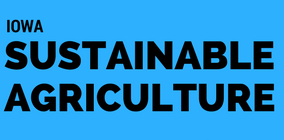This article originally appeared in the Iowa Informer on December 5, 2017:
Director Expresses Frustrations, Optimism for Leopold Center’s Future
Mark Rasmussen, the director of Iowa State University’s Leopold Center for Sustainable Agriculture, led a discussion Monday on campus about the future of the center after it was defunded this spring by GOP lawmakers, who would have scrapped it entirely if not for a line-item veto from then-Gov. Terry Branstad.
The discussion followed a series of listening sessions that a task force assembled by the center held across the state this summer and fall that were open to the public and at which attendees brainstormed ideas to keep the center open since lawmakers shifted its funding to the university’s Iowa Nutrient Research Center, which, like the Leopold Center, is part of the college of agriculture and life sciences. Establishedthrough the 1987 Iowa Groundwater Protection Act, the center had been receiving upwards of a million dollars a year from fees on nitrogen fertilizer, until GOP lawmakers allied with Big Ag successfully argued that it had outlived its usefulness.
Throughout the discussion, held in a classroom at the Hansen Learning Center, Rasmussen expressed frustration at the “anomaly” of the decision to defund the Leopold Center, chiding those lawmakers for relying on old biases against sustainable ag, but also optimism that the center would stay alive by refocusing its broad vision on more specific aims.
The event was the latest in the monthly Think Tank on Animal Agriculture hosted by the university’s animal science department on a variety of topics. “Hope, hype and misinformation abound on the topic of agricultural sustainability,” an email promoting Rasmussen’s discussion read. “Unconventional and uncomfortable thinking is sometimes necessary.”
Twenty people attended, including sustainable ag allies like Jan and Cornelia Flora, both retired ISU sociology professors; Joe Colletti, the interim endowed dean of the ag college now that former dean Wendy Wintersteen is ISU’s new president; and a representative from the Iowa Pork Producers Association.
With its funding slashed, Rasmussen joked that all that remained in the Leopold Center’s Curtiss Hall office were “me, Fred [Kirschenmann], and the coffee pot, essentially.” But, he added, as a former research microbiologist with the US Department of Agriculture and US Food and Drug Administration, “Having come here from the federal government, I was amazed at how far people could stretch $10,000.”
After it was defunded, the center still retained roughly $200,000 from interest on an endowment, and university researchers involved in Leopold grant-funded projects are continuing their work, with some exceptions. Rasmussen estimated that about 20 grants were transferred to the Nutrient Research Center where the former bulk of the Leopold Center’s funding is now funnelled. The Legislature allowed another grant to stay as is because of a legal obligation, he said, some projects ended earlier this year, and others that were slated to end in 2018 had their end dates pushed up to the end of December through contract revisions.
Four projects, stripped of their state funding, were officially canceled. However, Rasmussen said that the center was able to find alternative funding sources for each to keep them going. They include a study led by the university’s horticulture department on hops production as local breweries have become increasingly common in the state. “There’s not a lot known about how to grow hops in Iowa,” Rasmussen said.
Meanwhile, the Leopold Center has preserved its history, archiving information on all of the more than 500 competitive grants it has awarded over its 30 years in existence with the university’s Parks Library. Many of those grants were leveraged to get additional funding for their work or related research, whose topics have included reducing water pollution with riparian buffer strips, diversifying crop production, and exploring alternative production systems for raising hogs.
Rasmussen said that the center continues to receive the occasional donation, although he added, “Somebody asked me the other day, ‘Why, if I was a foundation and you’re still at risk of closure, would I want to give money?’ And I don’t really have a good answer for that.”
Still, he and Colletti, the interim ag college dean, said they were optimistic that the state Legislature would focus its attention on more pressing matters in 2018 than taking another shot at killing off the Leopold Center entirely. “We’re going on the assumption that we will continue, the Legislature did what they did, and they’ll leave us alone next year,” Rasmussen said.
Looking forward, he said, Colletti and he have talked about maintaining the center’s long-term, visionary reputation but with a more focused approach given its reduced funding. (“If you’re familiar with the center,” he said, “its original mission was very broad. I’d like to say it was everything related to ag, food, and farming.”) He pictured a “much more participatory” role for the center, with it serving as a “hub” for research projects and seeking out matching funds.
Colletti said that all of the ag college’s research centers, with the exception of Leopold, had already been operating this way. He predicted that legislators — as well as Gov. Kim Reynolds — would have their “plate full” with more important issues like tax reform in the upcoming session, affording the center the “opportunity to continue with a re-visioning.” The center’s endowment could be leveraged in the pursuit of new competitive grants, he said. Echoing a point Wintersteen made during her presidential search forum in October, he added that about 80 faculty members throughout the university continue to do work connected to the center.
“Do we like what happened?” Colletti asked. “Heck no. But let’s make the best of what we can.”





